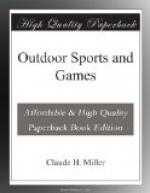No one can explain satisfactorily why the sap runs up in a tree and by some chemical process carries from the earth the right elements to make leaves, blossoms or fruit. Nature study is not “why?” It is “how.” We all learn in everyday life how a hen will take care of a brood of chicks or how a bee will go from blossom to blossom to sip honey. Would it not also be interesting to see how a little bug the size of a pin head will burrow into the stem of an oak leaf and how the tree will grow a house around him that will be totally unlike the rest of the branches or leaves. That is an “oak gall.” If you carefully cut a green one open you will find the bug in the centre or in the case of a dried one that we often find on the ground, we can see the tiny hole where he has crawled out.
Did you ever know that some kinds of ants will wage war on other kinds and make slaves of the prisoners just as our ancestors did in the olden times with human beings? Did you ever see a play-ground where the ants have their recreation just as we have ball fields and dancing halls? Did you ever hear of a colony of ants keeping a cow? It is a well-known fact that they do, and they will take their cow out to pasture and bring it in and milk it and then lock it up for the night just as you might do if you were a farm boy. The “ants’ cow” is a species of insect called “aphis” that secretes from its food a sweet kind of fluid called “honey dew.”
The ten thousand things that we can learn in nature could no more be covered in a chapter in this book than the same space could cover a history of the world. I have two large books devoted to the discussion of a single kind of flower, the “orchid.” It is estimated that there are about two hundred thousand kinds of flowers, so for this subject alone, we should need a bookshelf over a mile long. This is not stated to discourage any one for of course no one can learn all there is to know about any subject. Most people are content not to learn anything or even see anything that is not a part of their daily life.
The only kind of nature study worth while is systematic. It is not safe to trust too much to the memory. Keep a diary and record in it even the most simple things for future reference. All sorts of items can be written in such a book. As it is your own personal affair, you need not try to make it a work of literary merit. Have entries such as these:
First frost—Oct. 3rd
First snow—3 inches Thanksgiving day
Skating—December 3rd
Weather clear and bright on
Candlemas day, Feb. 2nd and
therefore ground-hog saw his
shadow
Heard crows cawing—Feb. 18th. Last year—Jan. 26th
Saw first robin—March 14th
Last snow—April 28th
There is scarcely anything in nature that is not interesting and in some way useful. Perhaps you will say “How about a bat?” As a matter of fact a bat is one of our best friends because he will spend the whole night catching mosquitoes. But some one will say “he flies into your hair and is covered with a certain kind of disgusting vermin.” Did you ever know of a bat flying into any one’s hair? And as for the vermin science tells us that they are really his favourite food so it is unlikely that he would harbour a colony of them very long.




